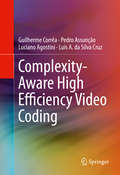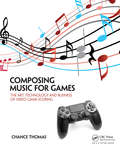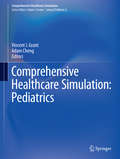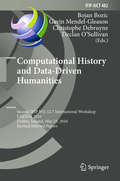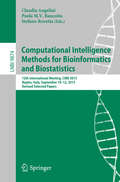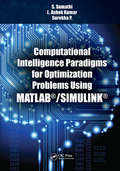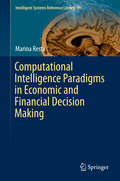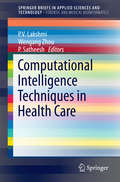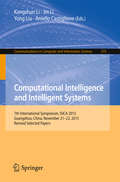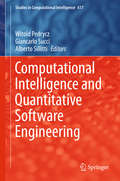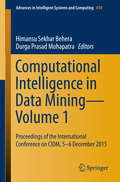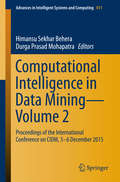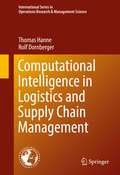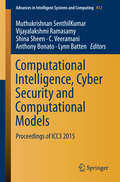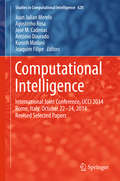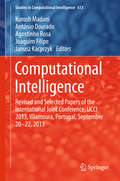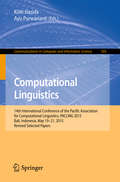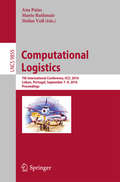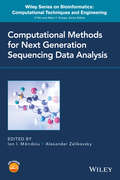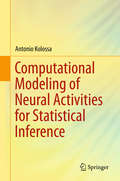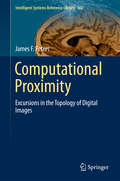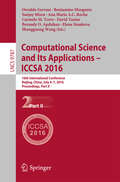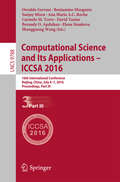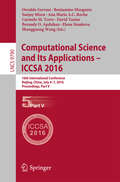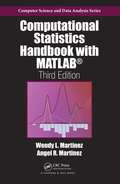- Table View
- List View
Complexity-Aware High Efficiency Video Coding
by Guilherme Corrêa Pedro Assunção Luciano Agostini Luis A. Silva CruzThis book discusses computational complexity of High Efficiency Video Coding (HEVC) encoders with coverage extending from the analysis of HEVC compression efficiency and computational complexity to the reduction and scaling of its encoding complexity. After an introduction to the topic and a review of the state-of-the-art research in the field, the authors provide a detailed analysis of the HEVC encoding tools compression efficiency and computational complexity. Readers will benefit from a set of algorithms for scaling the computational complexity of HEVC encoders, all of which take advantage from the flexibility of the frame partitioning structures allowed by the standard. The authors also provide a set of early termination methods based on data mining and machine learning techniques, which are able to reduce the computational complexity required to find the best frame partitioning structures. The applicability of the proposed methods is finally exemplified with an encoding time control system that employs the best complexity reduction and scaling methods presented throughout the book. The methods presented in this book are especially useful in power-constrained, portable multimedia devices to reduce energy consumption and to extend battery life. They can also be applied to portable and non-portable multimedia devices operating in real time with limited computational resources.
Composing Music for Games: The Art, Technology and Business of Video Game Scoring
by Chance ThomasComposing Music for Games is a guidebook for launching and maintaining a successful career as a video game composer. It offers a pragmatic approach to learning, intensified through challenging project assignments and simulations. Author Chance Thomas begins with the foundation of scoring principles applicable to all media, and then progresses serially through core methodologies specific to video game music. This book offers a powerful blend of aesthetic, technique, technology and business, which are all necessary components for a successful career as a video game composer.
Comprehensive Healthcare Simulation: Pediatrics (Comprehensive Healthcare Simulation #0)
by Vincent J. Grant Adam ChengThis is a practical guide to the use of simulation in pediatric training and evaluation, including all subspecialty areas. It covers scenario building, debriefing and feedback, and it discusses the use of simulation for different purposes: education, crisis resource management and interdisciplinary team training, competency assessment, patient safety and systems integration. Readers are introduced to the different simulation modalities and technologies and guided on the use of simulation with a variety of learners, including medical students, residents, practicing pediatricians, and health-related professionals. Separate chapters on each pediatric subspecialty provide practical advice and strategies to allow readers to integrate simulation into existing curriculum. Pediatric subspecialties covered include: General Pediatrics, Pediatric Emergency Medicine and Trauma, Neonatology, Pediatric Critical Care Medicine, Transport Medicine, Pediatric Anesthesia, and Pediatric Surgery amongst many others. Comprehensive Healthcare Simulation PEDIATRICS Edition is a volume in the series, Comprehensive Healthcare Simulation. The series is designed to complement Levine et al. , eds. , The Comprehensive Textbook of Healthcare Simulation by providing short, focused volumes on the use of simulation in a single specialty or on a specific simulation topic, and emphasizing practical considerations and guidance.
Computational History and Data-Driven Humanities: Second IFIP WG 12.7 International Workshop, CHDDH 2016, Dublin, Ireland, May 25, 2016, Revised Selected Papers (IFIP Advances in Information and Communication Technology #482)
by Bojan Bozic, Gavin Mendel-Gleason, Christophe Debruyne and Declan O'SullivanThis book constitutes the refereed post-proceedings of the Second IFIP WG 12.7 International Workshop on Computational History and Data-Driven Humanities, held in Dublin, Ireland, in May 2016.The 7 full papers presented together with 2 invited talks and 4 lightning talks were carefully reviewed and selected from 14 submissions. The papers focus on the challenge and opportunities of data-driven humanities and cover topics at the interface between computer science, social science, humanities, and mathematics.
Computational Intelligence Methods for Bioinformatics and Biostatistics: 12th International Meeting, CIBB 2015, Naples, Italy, September 10-12, 2015, Revised Selected Papers (Lecture Notes in Computer Science #9874)
by Stefano Rovetta Claudia Angelini Paola M. V. RancoitaThis book constitutes the thoroughly refereed post-conference proceedings of the 12th International Meeting on Computational Intelligence Methods for Bioinformatics and Biostatistics, CIBB 2015, held in Naples, Italy, in September, 2015. The 21 revised full papers presented were carefully reviewed and selected from 24 submissions. They present problems concerning computational techniques in bioinformatics, systems biology and medical informatics discussing cutting edge methodologies and accelerate life science discoveries, as well as novel challenges with an high impact on molecular biology and translational medicine.
Computational Intelligence Paradigms for Optimization Problems Using MATLAB®/SIMULINK®
by S. Sumathi L. Ashok Kumar Surekha. PConsidered one of the most innovative research directions, computational intelligence (CI) embraces techniques that use global search optimization, machine learning, approximate reasoning, and connectionist systems to develop efficient, robust, and easy-to-use solutions amidst multiple decision variables, complex constraints, and tumultuous environments. CI techniques involve a combination of learning, adaptation, and evolution used for intelligent applications. Computational Intelligence Paradigms for Optimization Problems Using MATLAB®/ Simulink® explores the performance of CI in terms of knowledge representation, adaptability, optimality, and processing speed for different real-world optimization problems. Focusing on the practical implementation of CI techniques, this book: Discusses the role of CI paradigms in engineering applications such as unit commitment and economic load dispatch, harmonic reduction, load frequency control and automatic voltage regulation, job shop scheduling, multidepot vehicle routing, and digital image watermarking Explains the impact of CI on power systems, control systems, industrial automation, and image processing through the above-mentioned applications Shows how to apply CI algorithms to constraint-based optimization problems using MATLAB® m-files and Simulink® models Includes experimental analyses and results of test systems Computational Intelligence Paradigms for Optimization Problems Using MATLAB®/ Simulink® provides a valuable reference for industry professionals and advanced undergraduate, postgraduate, and research students.
Computational Intelligence Paradigms in Economic and Financial Decision Making (Intelligent Systems Reference Library #99)
by Marina RestaThe book focuses on a set of cutting-edge research techniques, highlighting the potential of soft computing tools in the analysis of economic and financial phenomena and in providing support for the decision-making process. In the first part the textbook presents a comprehensive and self-contained introduction to the field of self-organizing maps, elastic maps and social network analysis tools and provides necessary background material on the topic, including a discussion of more recent developments in the field. In the second part the focus is on practical applications, with particular attention paid to budgeting problems, market simulations, and decision-making processes, and on how such problems can be effectively managed by developing proper methods to automatically detect certain patterns. The book offers a valuable resource for both students and practitioners with an introductory-level college math background.
Computational Intelligence Techniques in Health Care (SpringerBriefs in Applied Sciences and Technology)
by P. V. Lakshmi Wengang Zhou P. SatheeshThis book presentsresearch on emerging computational intelligence techniques and tools, with aparticular focus on newtrends and applications in health care. Healthcare is a multi-faceted domain,which incorporates advanced decision-making, remote monitoring, healthcarelogistics, operational excellence and modern information systems. In recentyears, the use of computationalintelligence methods to address the scale and the complexity of the problems in healthcarehas been investigated. This book discusses various computationalintelligence methods that are implemented in applications in different areas of healthcare. It includes contributions bypractitioners, technology developers and solution providers.
Computational Intelligence and Intelligent Systems: 7th International Symposium, ISICA 2015, Guangzhou, China, November 21-22, 2015, Revised Selected Papers (Communications in Computer and Information Science #575)
by Jin Li Yong Liu Kangshun Li Aniello CastiglioneThis bookconstitutes the refereed proceedings of the 7th International Symposium onIntelligence Computation and Applications, ISICA 2015, held in Guangzhou,China, in November 2015. The 77revised full papers presented were carefully reviewed and selected from 189submissions. The papers feature the most up-to-date research in analysis andtheory of evolutionary computation, neural network architectures and learning;neuro-dynamics and neuro-engineering; fuzzy logic and control; collectiveintelligence and hybrid systems; deep learning; knowledge discovery; learningand reasoning.
Computational Intelligence and Quantitative Software Engineering (Studies in Computational Intelligence #617)
by Giancarlo Succi Witold Pedrycz Alberto SillittiIn a down-to-the earth manner, the volume lucidly presents how the fundamental concepts, methodology, and algorithms of Computational Intelligence are efficiently exploited in Software Engineering and opens up a novel and promising avenue of a comprehensive analysis and advanced design of software artifacts. It shows how the paradigm and the best practices of Computational Intelligence can be creatively explored to carry out comprehensive software requirement analysis, support design, testing, and maintenance. Software Engineering is an intensive knowledge-based endeavor of inherent human-centric nature, which profoundly relies on acquiring semiformal knowledge and then processing it to produce a running system. The knowledge spans a wide variety of artifacts, from requirements, captured in the interaction with customers, to design practices, testing, and code management strategies, which rely on the knowledge of the running system. This volume consists of contributions written by widely acknowledged experts in the field who reveal how the Software Engineering benefits from the key foundations and synergistically existing technologies of Computational Intelligence being focused on knowledge representation, learning mechanisms, and population-based global optimization strategies. This book can serve as a highly useful reference material for researchers, software engineers and graduate students and senior undergraduate students in Software Engineering and its sub-disciplines, Internet engineering, Computational Intelligence, management, operations research, and knowledge-based systems.
Computational Intelligence in Data Mining--Volume 1: Proceedings of the International Conference on CIDM, 5-6 December 2015 (Advances in Intelligent Systems and Computing #410)
by Himansu Sekhar Behera Durga Prasad MohapatraThe book is a collection of high-quality peer-reviewed research papers presented in the Second International Conference on Computational Intelligence in Data Mining (ICCIDM 2015) held at Bhubaneswar, Odisha, India during 5 - 6 December 2015. The two-volume Proceedings address the difficulties and challenges for the seamless integration of two core disciplines of computer science, i. e. , computational intelligence and data mining. The book addresses different methods and techniques of integration for enhancing the overall goal of data mining. The book helps to disseminate the knowledge about some innovative, active research directions in the field of data mining, machine and computational intelligence, along with some current issues and applications of related topics.
Computational Intelligence in Data Mining--Volume 1: Proceedings of the International Conference on CIDM, 5-6 December 2015 (Advances in Intelligent Systems and Computing #411)
by Himansu Sekhar Behera Durga Prasad MohapatraThe book is a collection of high-quality peer-reviewed research papers presented in the Second International Conference on Computational Intelligence in Data Mining (ICCIDM 2015) held at Bhubaneswar, Odisha, India during 5 - 6 December 2015. The two-volume Proceedings address the difficulties and challenges for the seamless integration of two core disciplines of computer science, i. e. , computational intelligence and data mining. The book addresses different methods and techniques of integration for enhancing the overall goal of data mining. The book helps to disseminate the knowledge about some innovative, active research directions in the field of data mining, machine and computational intelligence, along with some current issues and applications of related topics.
Computational Intelligence in Logistics and Supply Chain Management (International Series in Operations Research & Management Science #244)
by Thomas Hanne Rolf DornbergerThis book deals with complex problems in the fields of logistics and supply chain management and discusses advanced methods, especially from the field of computational intelligence (CI), for solving them. The first two chapters provide general introductions to logistics and supply chain management on the one hand, and to computational intelligence on the other hand. The subsequent chapters cover specific fields in logistics and supply chain management, work out the most relevant problems found in those fields, and discuss approaches for solving them. Chapter 3 discusses problems in the field of production and inventory management. Chapter 4 considers planning activities on a finer level of granularity which is usually denoted as scheduling. In chapter 5 problems in transportation planning such as different types of vehicle routing problems are considered. While chapters 3 to 5 rather discuss planning problems which appear on an operative level, chapter 6 discusses the strategic problem of designing a supply chain or network. The final chapter provides an overview of academic and commercial software and information systems for the discussed applications. There appears to be a gap between general textbooks on logistics and supply chain management and more specialized literature dealing with methods for computational intelligence, operations research, etc. , for solving the complex operational problems in these fields. For readers, it is often difficult to proceed from introductory texts on logistics and supply chain management to the sophisticated literature which deals with the usage of advanced methods. This book fills this gap by providing state-of-the-art descriptions of the corresponding problems and suitable methods for solving them.
Computational Intelligence, Cyber Security and Computational Models: Proceedings of ICC3 2015 (Advances in Intelligent Systems and Computing #412)
by Anthony Bonato Lynn Batten Muthukrishnan Senthilkumar Vijayalakshmi Ramasamy Shina Sheen C. VeeramaniThis bookaims at promoting high-quality research by researchers and practitioners fromacademia and industry at the InternationalConference on Computational Intelligence, Cyber Security, and ComputationalModels ICC3 2015 organized by PSG College of Technology, Coimbatore, Indiaduring December 17 - 19, 2015. This book enriches with innovations in broadareas of research like computational modeling, computational intelligence andcyber security. These emerging inter disciplinary research areas have helped tosolve multifaceted problems and gained lot of attention in recent years. Thisencompasses theory and applications, to provide design, analysis and modelingof the aforementioned key areas.
Computational Intelligence: International Joint Conference, IJCCI 2014 Rome, Italy, October 22-24, 2014 Revised Selected Papers (Studies in Computational Intelligence #620)
by Joaquim Filipe Juan Julian Merelo Agostinho Rosa José M. Cadenas António Dourado Kurosh MadaniThe present book includes a set of selected extended papers from the sixth International Joint Conference on Computational Intelligence (IJCCI 2014), held in Rome, Italy, from 22 to 24 October 2014. The conference was composed by three co-located conferences: The International Conference on Evolutionary Computation Theory and Applications (ECTA), the International Conference on Fuzzy Computation Theory and Applications (FCTA), and the International Conference on Neural Computation Theory and Applications (NCTA). Recent progresses in scientific developments and applications in these three areas are reported in this book. IJCCI received 210 submissions, from 51 countries, in all continents. After a double blind paper review performed by the Program Committee, 15% were accepted as full papers and thus selected for oral presentation. Additional papers were accepted as short papers and posters. A further selection was made after the Conference, based also on the assessment of presentation quality and audience interest, so that this book includes the extended and revised versions of the very best papers of IJCCI 2014. Commitment to high quality standards is a major concern of IJCCI that will be maintained in the next editions, considering not only the stringent paper acceptance ratios but also the quality of the program committee, keynote lectures, participation level and logistics.
Computational Intelligence: Revised and Selected Papers of the International Joint Conference, IJCCI 2013, Vilamoura, Portugal, September 20-22, 2013 (Studies in Computational Intelligence #613)
by Joaquim Filipe Janusz Kacprzyk Agostinho Rosa António Dourado Kurosh MadaniThe present book includes a set of selected extended papers from the fifth International Joint Conference on Computational Intelligence (IJCCI 2013), held in Vilamoura, Algarve, Portugal, from 20 to 22 September 2013. The conference was composed by three co-located conferences: The International Conference on Evolutionary Computation Theory and Applications (ECTA), the International Conference on Fuzzy Computation Theory and Applications (FCTA), and the International Conference on Neural Computation Theory and Applications (NCTA). Recent progresses in scientific developments and applications in these three areas are reported in this book. IJCCI received 111 submissions, from 30 countries, in all continents. After a double blind paper review performed by the Program Committee, only 24 submissions were accepted as full papers and thus selected for oral presentation, leading to a full paper acceptance ratio of 22%. Additional papers were accepted as short papers and posters. A further selection was made after the Conference, based also on the assessment of presentation quality and audience interest, so that this book includes the extended and revised versions of the very best papers of IJCCI 2013. Commitment to high quality standards is a major concern of IJCCI that will be maintained in the next editions, considering not only the stringent paper acceptance ratios but also the quality of the program committee, keynote lectures, participation level and logistics.
Computational Linguistics: 14th International Conference of the Pacific Association for Computational Linguistics, PACLING 2015, Bali, Indonesia, May 19-21, 2015, Revised Selected Papers (Communications in Computer and Information Science #593)
by Kôiti Hasida Ayu PurwariantiThis bookconstitutes the refereed proceedings of the 14th International Conference of the PacificAssociation for Computational Linguistics, PACLING 2015, held in Bali,Indonesia, in May 2015. The 18revised full papers presented were carefully reviewed and selected from 45papers. The papers are organized around the following topics: syntax andsyntactic analysis; semantics and semantic analysis; spoken language anddialogue; corpora and corpus-based language processing; text and messageunderstanding; information extraction and text mining; information retrievaland question answering; language learning; machine translation.
Computational Logistics: 7th International Conference, ICCL 2016, Lisbon, Portugal, September 7-9, 2016, Proceedings (Lecture Notes in Computer Science #9855)
by Ana Paias Mario Ruthmair Stefan VoßThis book constitutes the refereed proceedings of the 7th International Conference on Computational Logistics, ICCL 2016, held in Lisbon, Portugal, in September 2016. The 29 papers presented in this volume were carefully reviewed and selected for inclusion in the book. They are organized in topical sections entitled: container terminals and maritime transportation; intermodal transport; location and routing; (general) logistics and supply chain management.
Computational Methods for Next Generation Sequencing Data Analysis
by Alexander Zelikovsky Ion MandoiuIntroduces readers to core algorithmic techniques for next-generation sequencing (NGS) data analysis and discusses a wide range of computational techniques and applications This book provides an in-depth survey of some of the recent developments in NGS and discusses mathematical and computational challenges in various application areas of NGS technologies. The 18 chapters featured in this book have been authored by bioinformatics experts and represent the latest work in leading labs actively contributing to the fast-growing field of NGS. The book is divided into four parts: Part I focuses on computing and experimental infrastructure for NGS analysis, including chapters on cloud computing, modular pipelines for metabolic pathway reconstruction, pooling strategies for massive viral sequencing, and high-fidelity sequencing protocols. Part II concentrates on analysis of DNA sequencing data, covering the classic scaffolding problem, detection of genomic variants, including insertions and deletions, and analysis of DNA methylation sequencing data. Part III is devoted to analysis of RNA-seq data. This part discusses algorithms and compares software tools for transcriptome assembly along with methods for detection of alternative splicing and tools for transcriptome quantification and differential expression analysis. Part IV explores computational tools for NGS applications in microbiomics, including a discussion on error correction of NGS reads from viral populations, methods for viral quasispecies reconstruction, and a survey of state-of-the-art methods and future trends in microbiome analysis. Computational Methods for Next Generation Sequencing Data Analysis: Reviews computational techniques such as new combinatorial optimization methods, data structures, high performance computing, machine learning, and inference algorithms Discusses the mathematical and computational challenges in NGS technologies Covers NGS error correction, de novo genome transcriptome assembly, variant detection from NGS reads, and more This text is a reference for biomedical professionals interested in expanding their knowledge of computational techniques for NGS data analysis. The book is also useful for graduate and post-graduate students in bioinformatics.
Computational Modeling of Neural Activities for Statistical Inference
by Antonio KolossaThis authored monograph supplies empirical evidence for the Bayesian brain hypothesis by modeling event-related potentials (ERP) of the human electroencephalogram (EEG) during successive trials in cognitive tasks. The employed observer models are useful to compute probability distributions over observable events and hidden states, depending on which are present in the respective tasks. Bayesian model selection is then used to choose the model which best explains the ERP amplitude fluctuations. Thus, this book constitutes a decisive step towards a better understanding of the neural coding and computing of probabilities following Bayesian rules. The target audience primarily comprises research experts in the field of computational neurosciences, but the book may also be beneficial for graduate students who want to specialize in this field.
Computational Proximity: Excursions in the Topology of Digital Images (Intelligent Systems Reference Library #102)
by James F. PetersThis book introduces computational proximity (CP) as an algorithmic approach to finding nonempty sets of points that are either close to each other or far apart. Typically in computational proximity, the book starts with some form of proximity space (topological space equipped with a proximity relation) that has an inherent geometry. In CP, two types of near sets are considered, namely, spatially near sets and descriptivelynear sets. It is shown that connectedness, boundedness, mesh nerves, convexity, shapes and shape theory are principal topics in the study of nearness and separation of physical aswell as abstract sets. CP has a hefty visual content. Applications of CP in computer vision, multimedia, brain activity, biology, social networks, and cosmology are included. The book has been derived from the lectures of the author in a graduate course on the topology of digital images taught over the past several years. Many of the students have provided important insights and valuable suggestions. The topics in this monograph introduce many forms of proximities with a computational flavour (especially, what has become known as the strong contact relation), many nuances of topological spaces, and point-free geometry.
Computational Science and Its Applications - ICCSA 2016: 16th International Conference, Beijing, China, July 4-7, 2016, Proceedings, Part II (Lecture Notes in Computer Science #9787)
by Shangguang Wang Osvaldo Gervasi Beniamino Murgante Sanjay Misra David Taniar Elena Stankova Ana Maria A.C. Maria A. C. Rocha Carmelo M. M. Torre Bernady O. O. ApduhanThe five-volume set LNCS 9786-9790 constitutes the refereed proceedings of the 16th International Conference on Computational Science and Its Applications, ICCSA 2016, held in Beijing, China, in July 2016. The 239 revised full papers and 14 short papers presented at 33 workshops were carefully reviewed and selected from 849 submissions. They are organized in five thematical tracks: computational methods, algorithms and scientific applications; high performance computing and networks; geometric modeling, graphics and visualization; advanced and emerging applications; and information systems and technologies.
Computational Science and Its Applications - ICCSA 2016: 16th International Conference, Beijing, China, July 4-7, 2016, Proceedings, Part III (Lecture Notes in Computer Science #9788)
by Shangguang Wang Osvaldo Gervasi Beniamino Murgante Sanjay Misra Ana Maria A. C. Rocha Carmelo M. Torre David Taniar Bernady O. Apduhan Elena StankovaThe five-volume set LNCS 9786-9790 constitutes the refereed proceedings of the 16th International Conference on Computational Science and Its Applications, ICCSA 2016, held in Beijing, China, in July 2016. The 239 revised full papers and 14 short papers presented at 33 workshops were carefully reviewed and selected from 849 submissions. They are organized in five thematical tracks: computational methods, algorithms and scientific applications; high performance computing and networks; geometric modeling, graphics and visualization; advanced and emerging applications; and information systems and technologies.
Computational Science and Its Applications – ICCSA 2016: 16th International Conference, Beijing, China, July 4-7, 2016, Proceedings, Part V (Lecture Notes in Computer Science #9790)
by Shangguang Wang Osvaldo Gervasi Beniamino Murgante Sanjay Misra Ana Maria A. C. Rocha Carmelo M. Torre David Taniar Bernady O. Apduhan Elena StankovaThe five-volume set LNCS 9786-9790 constitutes the refereed proceedings of the 16th International Conference on Computational Science and Its Applications, ICCSA 2016, held in Beijing, China, in July 2016. The 239 revised full papers and 14 short papers presented at 33 workshops were carefully reviewed and selected from 849 submissions. They are organized in five thematical tracks: computational methods, algorithms and scientific applications; high performance computing and networks; geometric modeling, graphics and visualization; advanced and emerging applications; and information systems and technologies.
Computational Statistics Handbook with MATLAB (Chapman & Hall/CRC Computer Science & Data Analysis)
by Wendy L. Martinez Angel R. MartinezA Strong Practical Focus on Applications and AlgorithmsComputational Statistics Handbook with MATLAB, Third Edition covers today's most commonly used techniques in computational statistics while maintaining the same philosophy and writing style of the bestselling previous editions. The text keeps theoretical concepts to a minimum, emphasizing the i
